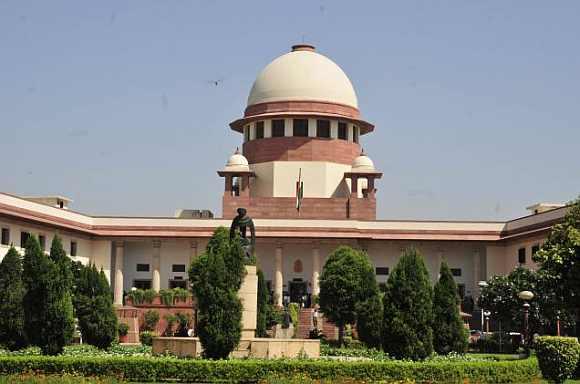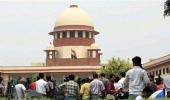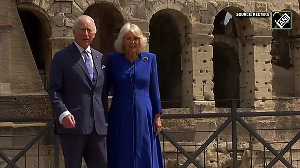
The Supreme Court on Wednesday disagreed with the Centre's submission that the penal provision on adultery was needed to save the sanctity of marriage, saying it does not appeal to common sense that a woman cannot prosecute her husband for adulterous relationship.
A five-judge constitution bench headed by Chief Justice Dipak Misra, which reserved its verdict on a plea challenging Section 497 of the Indian Penal Code, was told by the Centre that adultery was a 'public wrong' which damaged the sanctity of marriage and caused mental and physical injury to the spouse, the children and the family.
However, the bench, also comprising Justices R F Nariman, A M Khanwilkar, D Y Chandrachud and Indu Malhotra, said 'the husbands have been given a dominant position (in the law)'.
It also posed whether it is correct that two people get involved, fall in love and have a consensual relationship, but 'one is liable for prosecution and the other is not liable for prosecution'.
Referring to the inconsistencies in the penal law, it asked, 'What is the sanctity of marriage here. If the consent of husband is taken, then there is no adultery? ... What is this consent? There will be no offence if the husband consents to this relationship? What is this? What is the collective public good in Section 497 to hold that this (adultery) is an offence.'
The bench also questioned the law on various counts including that an extra-marital affair becomes non-punishable if the woman's husband stands by her adulterous relationship with another married person.
"We are not questioning the legislature's competence to make laws, but where is the 'collective good' in Section 497 of IPC (Indian Penal Code)," the bench asked.
This section of the 158-year-old IPC says: "Whoever has sexual intercourse with a person who is and whom he knows or has reasons to believe to be the wife of another man, without the consent or connivance of that man, such sexual intercourse not amounting to the offence of rape, is guilty of the offence of adultery."
Additional Solicitor General Pinky Anand, appearing for the Centre, commenced her arguments by saying that adultery has been made an offence keeping in mind the sanctity of marriage as an institution.
"Adultery is an action willingly and knowingly done with the knowledge that it would hurt the spouse, the children and the family. Such intentional action which impinges on the sanctity of marriage and sexual fidelity encompassed in marriage, which forms the backbone of the Indian society, has been classified and defined by the Indian State as a criminal offence in exercise of its constitutional powers," she said.
She said that judgement of foreign jurisdictions which had set aside adultery as a criminal offence, should not be taken into account and the instant matter has to be decided on the basis of the social conditions prevalent in India. Moreover, adulterous relationships are not protected under the right to privacy.
The bench said the law in question was only 'targetting' married women and not the men who can have relationships with unmarried women, widow and married women with the consent of their husbands.
"You expect married women to be loyal and you do not expect married men to be loyal," the bench said.
The law officer submitted that women are not being prosecuted for the offence of adultery and only outsider men, who disturb the sanctity of marriage, were being tried for the offence.
The inclusion of women cannot be permitted in the law in its present form, the bench pointed out. It said that only married women were being burdened with the task of maintaining the sanctity of marriage and 'one expects fidelity from women only'.
Consensual relationship outside marriage was an indication that the marriage has already broken down and such sexual intercourse should not have penal consequences, it said.
Stressing the need to have 'uncommon common sense' to understand the constitutional concepts, the court asked 'suppose somebody gets into an adulterous relationship, does it entitle the person to be prosecuted'.
"Adultery can still be a civil wrong and nobody has the right to enter into an adulterous relationship. But it does not mean that they would be prosecuted," the bench said, adding "when it is consensual, how can there be prosecution".
The bench said the idea behind having the provision in the statute was that women were treated as 'chattel of men' and the husbands should have the right to sue the paramours of their wives.
The bench also clarified that the it would not 'read down the law' but would either allow the proviso to remain or strike it down.
The law officer said that 20 states of the United States have retained adultery as an offence.
The bench disagreed with the submission saying that marriage as an institution is viewed differently in India.
The court said the concept of marriage has been evolving and now the consent of the spouse at the time of tying the knot does not remain in force for all time to come and 'there has to be consent of partners at every stage of life'.
The bench also said 'the state cannot impose a code of conduct on citizens saying they will have to conduct themselves in a particular manner'.
It said sometimes marriages break down in reality, but it subsists on paper. So, the issue is can there be prosecution for an offence of adultery in such cases.
"Sustenance of a relationship is based on the parties, their willingness to adjust and the State should not come into it," it added.
The Centre on Wednesday dared to tell the Supreme Court to restrain itself from making hard-hitting observations on public interest litigation matters saying these had an impact on several issues plaguing the country.
But the top court shot back to say that the judges were also citizens and knew the problems faced by the country, while making it clear that they 'are not criticising the government for everything'. It also asked the government 'to obey the law of the land'.
The exchanges between the court and the attorney general occurred when the bench was hearing a matter relating to inhuman conditions prevailing in 1,382 prisons across the country.
Attorney General K K Venugopal told a bench headed by Justice Madan B Lokur that he was not 'criticising' the apex court, but the problems facing the country were enormous and, in the past, its orders and judgments have resulted in a situation where people have lost their jobs.
He referred to apex court judgments on PILs relating to the 2G spectrum allocation cases and the order banning sale of liquor within 500 metres of highways across the country, saying these had impacted foreign investment and caused job losses respectively.
The top law officer told the bench, which also comprised Justices S Abdul Nazeer and Deepak Gupta, that the country was facing several problems and the court should also look at the progress made by the government.
But Justice Lokur shot back, "We are trying to solve some of these problems" and referred to the matters relating to the rights of widows, children and prisoners which were being dealt with by the apex court."
"We are also citizens of this country and we know the problems which the country is facing," the judge told Venugopal.
The AG told the court that while dealing with a matter, there are possibilities that the court might not consider the impact it would have on some other aspects.
"With the Supreme Court's intervention, tremendous inroads have been made but problems in India are enormous," he said.
To this, Justice Lokur said, "We are making it clear that we have not and we are not criticising the government for everything".
"Please do not carry the impression that we are criticising the government and preventing them from doing their work. You also look at the positive directions of the court," Justice Lokur said.
During the hearing, Venugopal referred to the issue of budgetary restrictions and said around 200 million people were living below the 'hunger line' and the government's priority was to pull such persons out of this.
"The question is how will you manage funds. This requires policy deliberation," he told the court and referred to the apex court's order quashing 122 telecom licences and banning sale of liquor within 500 metre of highways across the country saying several people had lost their jobs due to court orders.
He said if PILs were filed, there should be a separate paragraph in the plea dealing with the impact the issue raised might have on other aspects.
But the bench expressed its displeasure over the government collecting huge sums of money, running into over Rs one lakh crore, under the orders of the apex court, but these funds were not being used properly.
"Through orders of this court, you have got Rs 130,000 to Rs 150,000 crore. Do something with that money," the bench said.
Venugopal said these funds were collected for environment purposes.
The bench retorted that in one of the matters related to construction workers, over Rs 30,000 crore meant for welfare of these workers were used to buy laptops and washing machines.
"There is enough money. They (construction workers) do not have clothes to wear but washing machines were purchased. They are illiterates, but laptops were purchased," it said.
The AG told the bench that India has a population of around 1.3 billion which was increasing exponentially and there were several problems in the country.
"Day in, day out, I read newspapers and your observations," the AG told the bench.
To this, Justice Lokur said, "Rest assured that Article 21 (protection of life and personal liberty) will remain here and we will uphold it".
When the AG said that PILs should have a paragraph about the fallout of the issue raised on other aspects, the bench said, "Tell your law officers to argue on this line also. Tell your government to obey the law of the land".
Venugopal also referred to the past and said there was around 60 per cent poverty and same level of illiteracy in the country and these level have been brought down and it should not be said that the government was not doing anything.











 © 2025
© 2025